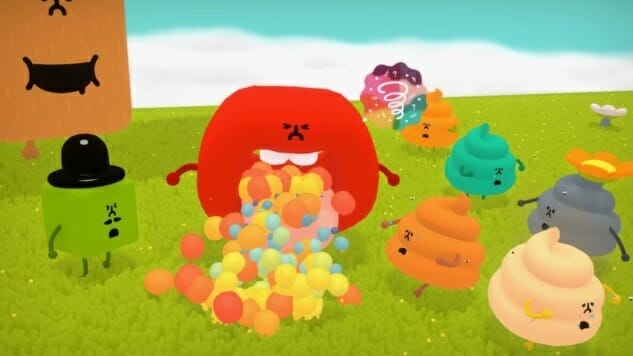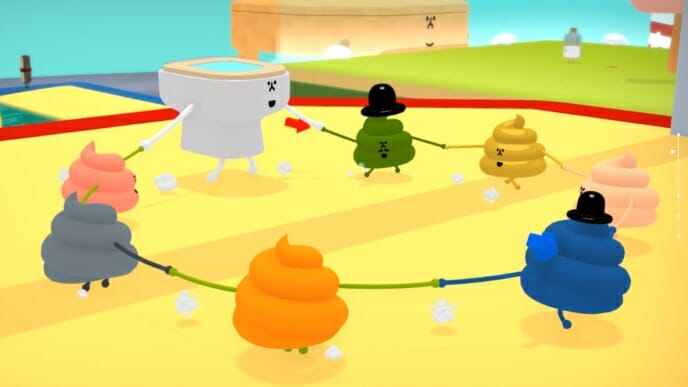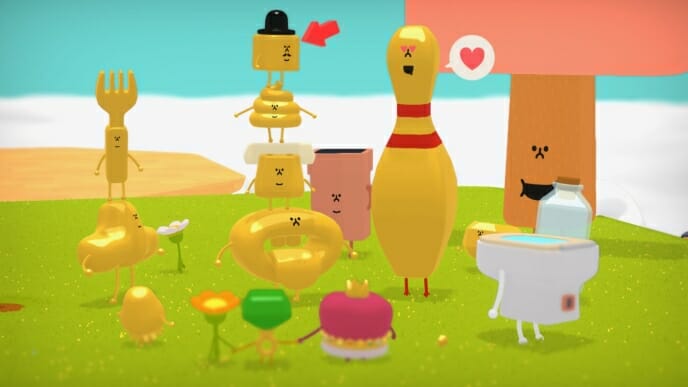
In 2019 the most unrealistic videogame scenario is one where everybody immediately just really likes each other. Instant, endless friendship was never a realistic goal but it feels more impossible than ever at a time when every single aspect of our lives and culture are regularly hijacked for divisive arguments and rancor. It’s hard to grab hands and dance in a circle when we’re constantly at each others’ throats.
This is what makes Wattam beautiful. The newest game from Katamari Damacy creator Keita Takahashi imagines a glorious world of friendship and joy, and is then kind enough to let us just hang out in it for a while. Yes, there are puzzles to be solved, and rudimentary “quests” to complete, but friendship is both the answer to and end result of almost every single one of them. The goal of Wattam is to make you feel warm and nice, like you’re comfortably snuggled up with your best friends, and it pulls it off perfectly.

Wattam’s inherent absurdity keeps it from feeling too saccharine or simplistic. As expected from the man who gave us Katamari and Noby Noby Boy, Wattam doesn’t even attempt to make sense in any traditional way. The first character you control is a green cube with a mustache and a top hat who can drop bombs from his hat whenever he wants to—and does so solely to entertain an ever-growing circle of friends that includes flowers, a nose, a giant mouth, a toilet, and countless other non-human objects given life. You can move your control from The Mayor, as our green cube is called, to any other character at any moment, and many of them have unique ways to interact with others. A crucial part of more than one puzzle involves taking control of the mouth, who then eats his friends, and shoots them back out as pieces of poop that look like the poop emoji. Sometimes you have to gild the poop. You can then control the poop, if you’d like, grabbing the hands of your friends and neighbors and dancing maniacally in a circle like you’re twirling around an imaginary maypole.
Why can you turn your friends into poop? Why can you then take control of the poop? Wattam posits that the better question is why not? Nothing feels real today anyway, and few things exist solely to make us unquestioningly, euphorically happy, so let Wattam have its ridiculous fixation on poop, and its unwavering devotion to its own dreamlike, childlike aesthetic.
Wattam sounds like it was played in front of a live studio audience. There’s a constant soundtrack of children laughing, gasping, oohing and ahhing, and responding to everything you do in the highly excitable manner of younguns who haven’t experienced much of life outside of the safety of their family and friends. Wattam is quite literally a safe space: a game we can play with no fear of trauma, no fear of being confronted by something that will threaten our good mood or make us feel dirty or sad. Characters might occasionally act out or show emotional distress, but it only lasts as long as it takes you to solve that puzzle. And then everybody’s friends again, stomping around together without a care in the world.

There’s no danger in Wattam, but that’s fine, as danger has increasingly become a regular part of our daily existence, and pure escapism is as valuable as it’s ever been. Still, there is a tension between the game’s bright, childlike atmosphere and its more absurd flourishes, and it’s that turf that adults who normally think they’re too mature or civilized for childish matters will latch on to. There’s nothing overtly sinister about Wattam, but the implications behind some of the actions the game tasks you with, and the almost manic exuberance with which it pursues its bright, cartoonish, fantastical dream world, can take on an unsettling tint. If you thought the Teletubbies show was creepy, what with its baby sun and the abstract wordlessness of their speech, you might feel similarly about Wattam.
Mostly, though, Wattam should make you feel happy. It should make you feel warm and welcome and loved. It’s a celebration of togetherness in a cartoon world that makes no sense, but in a joyful way that’s very different from how our real world currently makes no sense. It reminds us to just be friends, no matter our differences, no matter how often we swallow each other up and poop each other back out. That’s a message everybody could stand to hear these days.
Wattam was developed by Funomena and published by Annapurna Interactive. Our review is based on the Playstation 4 version. It is also available for PC.
Senior editor Garrett Martin writes about videogames, comedy, travel, theme parks, wrestling, and anything else that gets in his way. He’s on Twitter @grmartin.